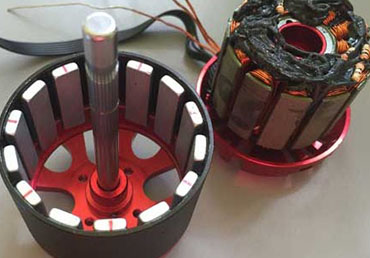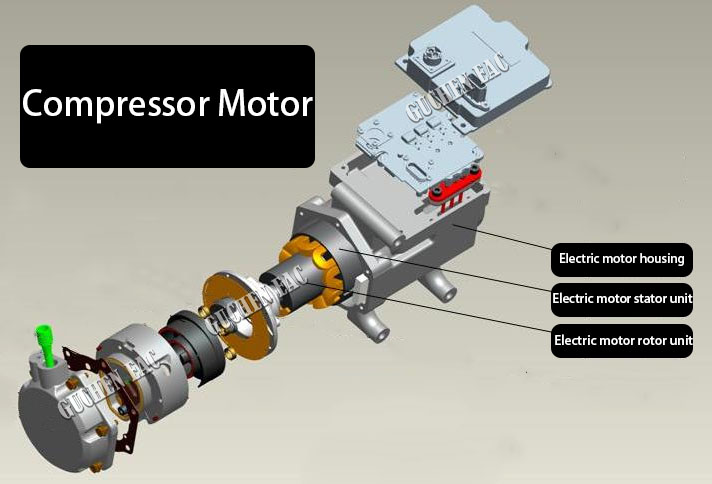AC motors can be divided into capacitive single-phase asynchronous motors, 3-phase asynchronous motors, and DC brushless motors.
Air-conditioning compressors on electric vehicles generally use permanent magnet synchronous motors or permanent magnet brushless DC motors, small in size and simple in control. The motor speed can be adjusted in a wide range according to needs.
In the article, Guchen EAC will list top 7 causes of electric motor failure and how they will burn the motor.
1. Motor Overload
When the motor is running in an overload state, it will cause 1) the motor speed to drop, 2) the current increases, 3) the temperature rises, and 4) the winding coils are overheated; If running for a long time, the motor will cause insulation failure and burn out at high temperatures;
2. High Ambient Temperature, Insufficient Heat Dissipation
When the motor winding coil is energized, it naturally heats up. Overheating of motor winding will destroy the insulation and burn the motor; Therefore, the cooling of the motor is very important to boost its performance. Paying additional attention to motor cooling can make a big performance difference.
3. Phase Loss or The Winding is Damaged
When the motor starts or runs normally, the three-phase load is symmetrical and uniform, and the three-phase circuits are balanced;
The disconnection of any group of the three-phase windings will cause the three-phase current to be unbalanced or excessive; Phase loss will increase the vibration (with abnormal noise), temperature rises, and speed fluctuation. The current between the windings will inevitably exceed the rated current, which will cause the motor coil to heat up and burn the electric motor after long-term operation;
4. Unstable System Voltage
If the power supply voltage is too high or too low, it will cause the load current to change. Excessive voltage can easily cause iron loss to increase; while too low voltage will decrease the electromagnetic torque, and increase copper loss. All will cause the electric motor insulation to overheat.
5. Mechanical Stall Phenomenon
During the operation of electric motor, electrical energy is converted into thermal energy and mechanical energy. When the motor stalls, the mechanical parts of the motor do not work, which is equivalent to converting all electrical energy into heat energy, and the temperature of the motor will rise rapidly, causing it to break down;
6. Frequent Starting and Stopping of Electric Motors
When the motor is running and starting, the starting current is usually relatively large. If it is frequently started and stopped in a short period of time, the stator coil will be frequently impacted by the large current and cause overheat;
7. Three-phase Current Unbalance
For the motor, the average value of the current of any one phase of the three-phase current and the other two-phase currents is not allowed to exceed 10%. The uneven current supply can easily cause phase loss and cause the motor insulation;



